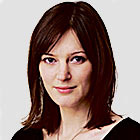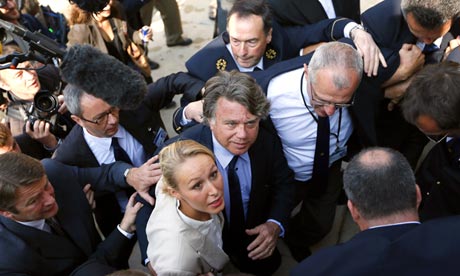Elizabeth Day The Observer, Sunday 28 October 2012
At 22, she is France's youngest ever MP. Her grandfather, Jean-Marie, founded the rightwing Front National and came second in the 2002 presidential race. Her aunt succeeded him as party leader last year. Now Marion Maréchal-Le Pen is the newest face of the party ready to bring its anti-immigrant policies to a younger generation
Marion Maréchal-Le Pen, centre, and Front National MP Gilbert Collard arrive at the French national assembly on 20 June, 2012. Photograph: AFP/Getty Images
One of the first times that Marion Maréchal-Le Pen took her seat in the Assemblée Nationale, the lower house of the French parliament, she was stopped by a male politician. "He looked at me and said: 'And whose secretary are you?'" says Maréchal-Le Pen.
In June, Maréchal-Le Pen became the youngest MP in modern French history, at the age of 22, after topping the poll in her constituency of Carpentras in the south-eastern region of the Vaucluse, with 49.09% of the vote. And yet the most disconcerting thing about her victory was arguably not her youth but her politics: Maréchal-Le Pen is an MP for the Front National and the newest face of the French far right. Her grandfather, Jean-Marie Le Pen, founded the political party which she now represents, a party which is anti-Europe, anti-globalisation and which believes in stringent immigration controls and national protectionism.
"Integration is no longer possible," she says. "When you're the single French person in the middle of 10 Tunisians, the majority will impose their way of life on the minority."
Blonde, slim and striking, Maréchal-Le Pen talks in a fluent and engaging manner. When we meet in her small, airless office in the headquarters of the Assemblée Nationale in Paris, her hair is swept back in a ponytail, her clothes are fashionable but discreet: a black top with zip detailing at the shoulders, tailored beige trousers, boots with a sensible heel. In a building filled with middle-aged men in grey suits, Maréchal-Le Pen stands out.
The fact is that she looks like a 22-year-old – albeit one in possession of an extraordinary degree of focus and ambition – and it is perhaps this that makes it difficult to believe she espouses some of the hardline views that form part of her personal and political heritage. She says she is used to people underestimating her.
"It happens," she shrugs. "People have said I'm a puppet, an instrument of my grandfather but I think they quickly realised that I'm my own person, that I have autonomy in my actions. I think they rapidly realised I could look after myself."
And yet however much she might try and distance herself from it, the Front National's grubby history casts a long shadow. Maréchal-Le Pen was born in 1989, two years after her grandfather claimed in an interview that the Nazi gas chambers were "a point of detail of the second world war" and six months before Front National supporters were accused of desecrating a Jewish cemetery in Carpentras, the town that would later become her constituency.
She grew up surrounded by far-right politics in a red-brick manor house called the Pavillon de l'Écuyer in the western Paris suburb of Saint-Cloud that is home to several generations of Le Pens. Behind the rows of oak trees and conifers which shield it from public view, the house continues to play host to the entire dynasty: Jean-Marie, the 84-year-old elder statesman, presides over events and has his office on the first floor. Marine Le Pen, the youngest of his three daughters, who succeeded him as party leader last year, lives above a former stable in the extensive grounds. Marion lives with her mother, Yann, Jean-Marie's middle daughter, on the second floor of the main house. Maréchal-Le Pen's divorced parents are both heavily involved in the Front National: her mother organises the party's rallies and her father, Samuel Maréchal, used to lead its youth movement.
It is partly as a result of this curious setup that many have accused Maréchal-Le Pen of being little more than a photogenic figurehead for a party seeking to ditch its thuggish past in search of more mainstream credibility. There are those who question whether she genuinely believes the policies she's pitching to the wider public.
"She speaks rather well," says the French cultural commentator Agnès Poirier, "but a little like a law student who has memorised her dissertation."
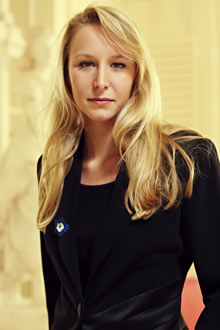
Marion Maréchal-Le Pen, France’s youngest MP, and the latest in the family dynasty. Photograph: Rannjan Joawn/Observer New Review
And it is true that her presence on the political stage forms part of a broader attempt at rebranding the party. Maréchal-Le Pen's aunt, Marine, has been instrumental in dragging the image of the Front National into the modern era, moving away from racist rhetoric, reaffirming secularism and insisting that France should stand on its own two feet and leave the euro. In April 2011, Marine banned regional councillor Alexandre Gabriac from the party after a photograph of him giving the Nazi salute was leaked to the press, calling his behaviour "intolerable". In return, she has been rewarded with electoral success: the Front National is now the third largest party in France. When Marine stood as a candidate in the presidential elections earlier this year, she electrified the race by polling 17.9% in the first round – more than 6m votes – eventually finishing third behind François Hollande and Nicolas Sarkozy. But it has not all been plain sailing: although her niece was elected to parliament in June, Marine Le Pen lost her bid to win a seat by 118 votes.
The party's parliamentary hopes now rest on Maréchal-Le Pen, who is seen as an astute, media-friendly young woman capable of mobilising widespread support and reinvigorating the immigration debate. But there are those who question her own commitment, believing that she is little more than her grandfather's mouthpiece.
According to Matthew Fraser, a professor at the American University of Paris: "The old man [Jean-Marie] is grudgingly fading away – and it is grudging, there is talk that he misses the spotlight. He's hardly in retirement. For now, the granddaughter is an attractive and young symbol – probably not a real power in the system."
I ask Maréchal-Le Pen if she discusses political strategy with her elders around the dining table in the family mansion. "No, not at all," she replies. "We are all able to have our private lives. We're lucky to have such a close family, with my grandfather and cousins around us. We're very blessed. I think because we've always been confronted by adversity from the outside so we've become closer because of that, because we've had to be a strong unit to withstand those blows."
She says she first developed an interest in politics at the age of 16 and supported Sarkozy in the 2007 presidential elections. But she soon became disenchanted by him and, at the age of 19, started to help out with campaigning for the Front National and volunteered for the youth wing of the party. She combined standing as an MP with her postgraduate studies in public law and is still a student at Panthéon-Assas University, a traditionally rightwing institution. Her grandfather, a former paratrooper who also went on to study law, was himself once the youngest MP in French politics when he was elected in 1956 at the age of 28. Is he proud of her carrying on the family tradition?
"I think so," she says. "I hope so. He is proud of those who seek to take back their heritage and is passionate about France and he's happy that young people are becoming engaged [Marion's electoral success was due in part to her popularity among voters aged 18-25]. I don't agree with everything he says, but I agree with the essential spirit and of that he's proud. What he hates most of all is inertia, people who are spectators."
What, then, are her policies? She lists them, one by one, in rapid-fire – at one point, she is speaking so quickly that her adviser, Arnaud, has to remind her to slow down as French is not my first language.
"But dammit, I am speaking slowly!" she protests and then carries on at the same breakneck pace. On the economy, she wants France to abandon the euro and readopt the franc. She wants tighter regulation for financial institutions in the wake of the banking crisis and lower taxes for French businesses in order to regain consumer confidence. She is vehemently anti-EU – a position that has found favour with republican French voters who believe the integrity of their nation is endangered by federal government. And she claims that the Front National has taken a truly "feminist" stance on maternity leave by devising a policy that would give stay-at-home parents a salary. Although, when I ask if she considers herself a feminist, she replies: "No, not especially. I'm not obsessed with the rights of women, it can be a bit excessive. I want to put men and women on an equal footing. I think we are equal, but different." She is against positive discrimination or quota systems, believing that women should be treated on their own merits.
"Then, of course, we have our policies on immigration," she continues. "More and more communities are asking for the introduction of their specific religious law and that is a threat to secularisation. It's particularly an issue among Muslim communities. Not all Muslims," she clarifies, hastily. "Most Muslims in France are not fundamentalists. What is surprising is that the first generation of immigrants were very well assimilated. They didn't wear the veil in public. They kept their religion in the private sphere. Now whole immigrant communities are being created – because of past government policies – that are separate."
In France, where the divorce of church from state underpinned the French revolution, secularisation is viewed as a basic tenet of the country's progressive thought. Since April 2011, women have been banned from wearing the burqa or the niqab in public. In this context, Maréchal-Le Pen's comments are not especially controversial. But then she goes even further, outlining a plan to strip second-generation immigrants of citizenship if they commit a crime or refuse to learn French.
"Today, if someone is born in France, they automatically have French nationality even if they have made no effort to integrate," she says. "We believe that French people should be prioritised for social housing and employment opportunities, if they have an equal competence."
But what about the "genuine" French? If they commit a crime, will they too be stripped of their nationality?
"No. We're talking about people to whom we've done a favour," Maréchal-Le Pen leans forward, elbows on her knees, legs apart. She maintains eye contact and talks with a kind of easy charm that could, in the right circumstances, be quite hypnotising. "We've given them a certain number of privileges and if they haven't shown themselves to be worthy of French citizenship, then it's normal to take it back."
This is all so smoothly expressed, that it takes a moment for the impact of it to hit home: that the law, under the Front National, would mean one thing for those descended from immigrants and another thing entirely for what Maréchal-Le Pen views as the "true" French race.
Isn't her stance racist? "That accusation is largely used by our opponents to discredit us. I don't see how it's racist to prioritise French nationals. We're not talking about black or white. It's normal that French people who pay taxes should be prioritised, just as an Algerian who is naturalised will have priority [in social housing and employment]."
She points out that people from Martinique, for example, would not be subject to the proposed nationality restrictions because the Caribbean island is an officially designated region of France and goes on to name a number of Front National members from ethnic minority backgrounds, including Charlotte Soula, the office manager of Marine Le Pen who is of Algerian origin (and a convert from Islam to Catholicism).
"The racism argument is a very violent one but it works less and less," says Maréchal-Le Pen. "Now, on the ground, people don't think it any more of us. They understand it's a political tactic. Most people think we're right.
"It's a debate that stirs up emotions, of course it is. It's hard to talk about it because of the human dimension that affects people. We are not monsters. I have empathy, I am humane, I understand human misery. My grandfather always said: 'Don't be angry at the immigrants, be angry at the political class that created this situation.' I've nothing against people who come to France in search of a better life. If France had the means to welcome everyone, we would. We have that history [of tolerance]. But we don't have the means. We are in debt. Our welfare system is melting under the pressure. We have a colossal deficit. It's sad but we have to have the political courage to say 'stop'. And it's sad because, when we say 'stop', we are saying it to a man or a woman, but there we go."
Immigration, she concedes, "has also been good" for France. The problem, as she sees it, is that past government policies have failed, causing resentment among those who believe their country is being overrun by "outsiders". She goes on to claim that a number of Muslim women, who feel pressurised into wearing the veil within their communities, are also supportive of her position.
"There are women who say to me, 'I can't wear a skirt,' or 'I'll be insulted if I don't wear a veil or don't go to the mosque.' There's a pressure within the community imposed by others. Those people, more and more, are calling on us to act because we are the only ones who see secularism as fundamentally important."
Is the Front National becoming a political force to be reckoned with in France? The election of Maréchal-Le Pen in June, alongside fellow party candidate Gilbert Collard, gave the party a foothold in parliament for the first time since the mid-1980s, but the first-past-the-post electoral system is still weighted against smaller parties. As a result, the popularity of the Front National – especially in impoverished, semi-urbanised rural areas where unemployment is high – might be far more ingrained than the electoral results suggest.
As Hugh Schofield, a BBC news correspondent based in Paris, wrote in an article last April: "In this semi-urbanised countryside, people feel the hopelessness of a life in poverty uncompensated-for by the traditions and structures that would have made it bearable in the past.
"Shops are now in vast out-of-town zones; no one goes to church; work is a 50km drive away. And the cost of the two staples – cigarettes and petrol – has just shot through the roof.
"For these people, a Front National vote offers both a protest (against the wealthy; against the EU; against the establishment), but also a claim: for an identity and the right to a traditional 'French' way of life."
In urban areas, too, there are fears about mass immigration – fears that were heightened by the 2005 riots by mostly French youths of north African origin from the suburbs of Paris and other major cities. The riots highlighted chronic tensions caused by immigration and unemployment and the mainstream parties began to adopt the rhetoric of the Front National. Sarkozy, who was interior minister at the time, referred to the rioters as racaille or scum – a term viewed by some as having implicitly racist connotations.
"Sarkozy won in 2007 by shifting to the right and stealing FN votes," explains Matthew Fraser. "In that sense, [Jean-Marie] Le Pen was ahead of his time – whether his views are despicable or not is a moral question, but what is certain is that they are electorally popular. And his adversaries understand this. Hence the paradox: they pretend the FN is ideologically unfrequentable, yet they steal the party's discourse and platforms to get elected. It's rather like borrowing someone's house to throw a party, but not inviting the owner."
France has a long history with the far right which has traditionally been allied with the Catholic church (even the former president François Mitterrand was, as a young man, involved in conservative nationalist movements) and Marine Le Pen's attempts to decontaminate the image of the FN have not been without success. "Today, the reality is that the extreme right is against us," she claimed in an interview for The Nation last year. "The National Front has evolved."
Despite a recent groundswell of support in provincial France, however, the party is still viewed with outright distaste among the Parisian chattering classes.
"In France it is acceptable, even fashionable, to espouse far-left political convictions, but absolutely unacceptable to belong to the far right," says Fraser. "The explanation is largely historical. France has been living with the shame of the Nazi collaboration under the Vichy regime, after which the far right was marginalised from what are considered to be acceptable political values in France."
And there are those who caution against believing that a leopard can change its spots. Alain Jakubowicz, the president of Licra, the international league against racism and antisemitism, puts it this way: "Today, the party is represented by a young woman with a modern and normal appearance [but] the FN remains the same, with its xenophobic, racist and antisemitic DNA."
Back in her office, Maréchal-Le Pen insists that the Front National's transformation is not simply a superficial public relations exercise.
"Of course the party has evolved," she says. "The problems are no longer the same, so evolution has happened naturally… When the Front National was created in the 1970s it was against the background of communism and the cold war. It was a real threat, now it's no longer the case… Now our main hobby-horse is anti-globalisation."
She insists that she has only ever encountered "a positive reaction" on the street. "Even people who don't share my politics, they say: 'I'm not Front National but I'm happy you're there because it creates debate.'"
Arnaud, her adviser, helpfully interrupts at this point to remind her that she recently went to a fashionable Parisian restaurant and was given a spontaneous round of applause by the diners. Maréchal-Le Pen looks embarrassed.
"The owner was very kind and he took me around and said: 'Tonight we're welcoming Mademoiselle Maréchal-Le Pen,' and everyone clapped," she says hurriedly. "It was really kind."
Does she ever receive hate mail?
"I've had one letter."
Arnaud interjects. "But if I get out all the ones that say how marvellous you are, how beautiful, there's no comparison," he gushes.
It seems incredible that she has only ever had one piece of negative mail. I tell her that in the UK, journalists get more than that in any given week.
"The most aggressive people are other MPs," she says. "Some of them are very aggressive, even though we've all been democratically elected." Jean-François Copé, the leader of the centre-right UMP party, has in the past refused to shake her hand. "He might refuse to shake my hand, but his electors will gladly do so," is her response. Spoken like a true politician.
I can see why Maréchal-Le Pen is electable. In person, she has an engaging, accessible manner. There is the occasional glimpse of humour – when we are talking about her party's maternity leave policies, the subject of children comes up. Does she want a family? She guffaws. "Yes, if I can find a suitable sperm donor."
At the same time, I find her charisma unsettling because it is being deployed in the defence of some dubious beliefs. As the interview draws to a close, I tell her I have one final question and it's a personal one. She nods, encouraging me to go on.
I am married to a man whose father came to the UK from Sudan, I say. If he lived in France under a Front National government, my husband would therefore fall into that category of second-generation immigrants who would have to prove deserving of a citizenship automatically conferred on others. Given this, I wonder what her position is on marriages between people from different backgrounds?
Maybe it's because I'm expecting a reaction that I think I see a slight flinch in her face. It is a tiny movement: the expression of someone who has effectively masked their surprise.
"I'm not against it," she replies. "For me, marriage is a very personal choice. The only thing I'd say is that I know, from people who've told me firsthand, that sadly mixed marriages can be a bit conflicted on everyday issues. For instance, the naming of children – Muslims need children to take Muslim names, often they want women to convert to Islam. The other surprising thing is that often, in a divorce, north African fathers take their children back to their country and the mother never sees them again. That causes problems. I don't judge, but it can cause conflict."
And yet she has judged, making a series of sweeping assumptions on the basis of very little actual knowledge about a particular set of personal circumstances. Perhaps Maréchal-Le Pen is right that immigration needs to be discussed and that MPs are wary of doing so in case they are accused of racism. Some of her opinions have the sheen of plausibility. She is not unlikable. But the tone of her last answer suggests a more disturbing set of beliefs at play beneath the surface: a whiff of something rotten at the core of her politics and a sense that the world is made up of people who can be divided easily into "us" or "them".
A family business: the Le Pen dynasty
Jean-Marie Le Pen
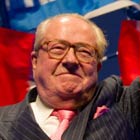
Photograph: Chamussy/Sipa/Rex Features
1928 Born 20 June in Brittany, the son of a fisherman.
1972 Le Pen co-founds the Front National and presides over it for nearly 40 years.
1984 Becomes an MEP.
1987 Is found guilty of violating French law and fined 1.2m francs (£150,000) for remarks concerning the presence of gas chambers in Nazi concentration camps. During an interview in September, he said: "I am not saying that the gas chambers did not exist. I haven't studied the questions specially. But I believe that it is a minor detail in the history of the second world war."
1996 While in Munich, Le Pen reiterates the 1987 remark, describing the concentration camps as a "detail" in second world war history. He is later convicted and fined by a Munich court.
2000 Suspended from the European parliament following conviction for the physical assault of Socialist candidate Annette Peulvast-Bergeal during the 1997 general election. This ultimately led to him losing his seat in the European parliament in 2003, although he was re-elected the following year.
2002 Achieves second place in the first round of voting in the French presidential election, winning 16.9% of the vote. He was subsequently defeated by Jacques Chirac in the second round by a large margin.
2005 Fined €10,000 by a Paris court for "inciting racial hatred" in anti-Islamic comments he made in an interview with Le Monde.
2011 Resigns as party leader of the Front National. Succeeded by his youngest daughter, Marine.
Samuel Maréchal
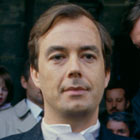
Photograph: Jacques Pavlovsky/Sygma/Corbis
1967 Born 20 September, son of a Pentecostal pastor.
1985 First becomes active in the Front National and in 1990 becomes the director of the Front national de jeunesse (FNJ), the Front National's youth wing. Also party chairman in the Pays de la Loire.
1993 Marries Yann Le Pen, the second daughter of Jean-Marie Le Pen. The couple divorce in 2007 after having three children together.
1995 Establishes the Association de recherche pour l'emploi des jeunes (ARPEJ), to promote priority for French people in the jobs market.
1995 Given an eight-month prison sentence and a fine of 5,000 francs for "assault and battery and conspiracy", after violence broke out between Front National militants and students in Gascony in March. In court, he is defended by his sister-in-law, Marine Le Pen. Later pardoned.
1998 Founds Générations Le Pen, now led by Marine Le Pen. His alliance with Jean-Marie Le Pen earns him the nickname "the son".
1999 States that France is becoming "a multi-ethnic and multi-religious society" and that "Islam is now France's second religion". He added: "So we need to organise a real political conquest."
2002 Organises Jean-Marie Le Pen's presidential campaign. He is responsible for Le Pen's communication strategy and is renowned for the infamous soundbite: "I'm socially left, economically right, and more than anything, nationally French."
2008 Marries Cécile Houphouët-Boigny, the great-niece of the first president of Ivory Coast, Félix Houphouët-Boigny.
2009 Maréchal & Associés financial consultancy firm is launched. It has offices in both Paris and Abidjan.
Marine Le Pen
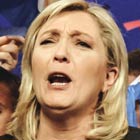
Photograph: Jean-Philippe Ksiazek/AFP/Getty Images
1968 Born 5 August, the youngest daughter of Jean-Marie Le Pen.
1986 Joins the Front National aged 18 and by 2000 is elected on to the party's executive committee.
1991 Graduates with a master of laws and a master of advanced studies in criminal law from Pantheon-Assas University in Paris, France's leading law school. Registered at the Paris bar association, she works as a lawyer between 1992 and 1998, before becoming a regional councillor in Nord-Pas-de-Calais and joining the Front National's legal department.
2003 Elected vice-president of the Front National, an office she holds for the next eight years.
2004 Becomes an MEP for the Ile-de-France region.
2010 Described by French journalist Guillaume Tabard as the "revelation of the year". He further described her as "first an electoral phenomenon" and "a media phenomenon after".
2011 Following her father's resignation, she wins the Front National party leadership in January with 67.7% of the vote. She is currently the party's president and its honorary chairman. She says of the party: "I refuse to accept as inevitable the fact that we are being consigned to the edge of political life."
2012 Runs as a candidate in the French presidential election, finishing third behind François Hollande and incumbent president Nicolas Sarkozy. She won more than 6 million votes in the first round: 17.9% of all votes cast. On the campaign trail, she tells supporters: "Whatever happens in the coming two weeks, the battle of France is only beginning… we are now the only true opposition to an ultra-liberal and libertarian left wing."
Marion Maréchal-Le Pen

Photograph: Rannjan Joawn for the Observer
1989: Born 10 December, the daughter of Samuel Maréchal, niece of Marine Le Pen and granddaughter of Jean-Marie Le Pen. Her childhood was spent in the Le Pen family mansion in the wealthy Paris suburb of Saint-Cloud.
2007: Joins the Front National at the age of 18.
2008: Enrols in a master's degree in public law at Pantheon-Assas University in Paris.
2010: Runs unsuccessfully in the 2010 regional elections in Yvelines, Ile-de-France.
2012: Says: "Contrary to what everyone thinks, in my family we didn't talk about politics at home and we're free to make our own choices."
2012: Becomes France's youngest MP in modern political history, winning a seat for the Front National in Vaucluse, Provence, at the age of just 22.
Bryony Clarke
Marion Maréchal-Le Pen: the new face of the French right | World news | The Observer
